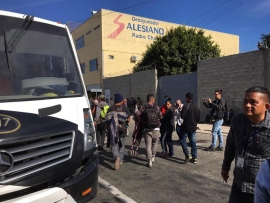by Fr Ernesto Hernández Ruiz SDB and the Salesian Migrants Team
Beginning last October, a major movement of Hondurans has arisen, one that has left San Pedro Sula, and mainly headed for the United States, to exercise their right to asylum, or to request recognition of their refugee status in Mexico.
These are three caravans of migrants with a broad heterogeneous population in terms of age and social conditions. The majority are young people, children and adolescents who travel in groups and, many of them, in families. The civil society organizations have counted 7,233 migrants: 32.86% are children and adolescents, most of whom are accompanied by their mothers and in some cases by both parents. Almost 200 unaccompanied adolescents were also counted. Adults, in most cases, are young people no older than 25 years.
Historically the peoples of America have been formed by migrations, both extra-continental and continental. In this past century there have been mass movements of people and peoples, a reawakening of the migratory phenomenon; and yet one of its current characteristics is the environment of violence. Currently, the main reason for starting a caravan is to be able to cross Mexico safely.
Today we must see the present context of inhumanity and the humanitarian crisis that this exodus represents, and see them with the eyes of a Pastor-Educator like Don Bosco, who was able to create an exceptional project for young migrants moving from the countryside to the city, creating a project that has been valid for over 150 years.
Inspired by a declaration of the Congregation through the Dicastery for the Missions, and by the experience gained with various organizations committed to migrants, I propose the following actions for a Salesian focus towards the migrants:
Adequate support, through an attitude of charitable reception in the face of urgent needs
Offering the exercise of charity is essential. Humanitarian support is the first step that shows Salesian love towards minors and young people, especially the poorest and most at risk, the unaccompanied.
Cooperation as a Network is fundamental
Commitment to a minor or young migrant requires effective cooperation. The limits of knowledge and time must be recognized, as is assessing one's own qualities and fields of knowledge in order to collaborate with other ecclesial organizations, as well civil and the State, while putting the youngsters and not our protagonists at the center of the interventions or actions.
Education is the key element of our contribution to the networks
In addition to humanitarian aid, our charism leads us to act as educators, seeking complete and lasting solutions. This will not happen quickly and we must think of solutions that imply formal and non-formal education of people who wish to remain in our territory for a long time or indefinitely.
Promotion and protection of the rights of minors and young people
Migrating in Mexico is not a crime: migrants are irregular, not illegal. They have the right to education, to food, to health, to justice, to security ... And, even more importantly, they are for us, sons and daughters of God our Father; they have a divine right to a dignified life.
Social integration
In recent days, opinions have been expressed by the Mexican state and civil society showing a heavy mantle of prejudice, stigmatization, racism and xenophobia. If these people, the migrants, are looking for a place where they can live in better conditions (in many cases recognizing that leaving their country is their only life option), we must start a campaign against these attitudes (of discrimination).
As Salesians of Don Bosco we reaffirm our mission: building bridges and not walls, so that those who have suffered so much, minors and young people, will be heard and respected.
To this end, we offer our support and we encourage everyone to maintain a strong identity and to be involved in the processes of inclusion, in a new context and in a process of true interculturality.
https://www.infoans.org/en/sections/special-reports/item/6782-mexico-a-salesian-look-at-migrant-caravans#sigProIdd3115a3c8a



